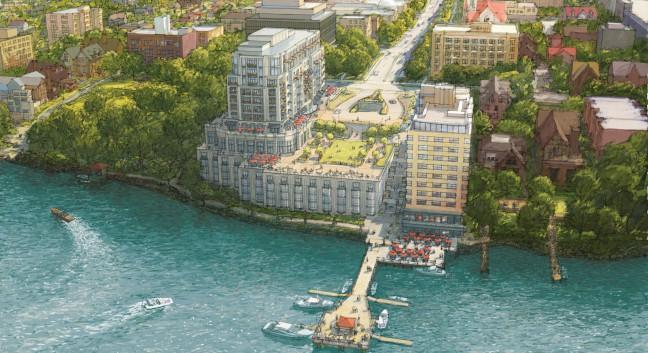The City Council passed the 2010 city budget early this morning, ultimately deciding to retain the tax increment financing funds for the Edgewater project in the capital budget.
Mayor Dave Cieslewicz said he had four goals for the budget: to keep the library, to retain the TIF funds for the Edgewater Hotel, to not dip into the fund balance and to have a property tax increase of less than 4 percent.
However, the tax levy accumulated to a 4.09 percent increase on the average Madison home, according to Comptroller Dean Brasser, slightly over Cieslewicz’s goal.
The amendment for the TIF funds sparked considerable debate among the alders, centering on whether this was the appropriate time to be adding such money for a project when exact details for the final Edgewater project are still preliminary and speculative.
The council voted to pass a substitute amendment preserving the TIF funds in the capital budget Wednesday, but also cemented language that reinforced the idea that retaining the funds merely acts as a placeholder, and does not indicate either support or opposition to the overall Edgewater project.
The inclusion of the TIF funds does not currently commit the city to give the developer any funds, according to City Attorney Michael May.
The original amendment from last week called for removing the $16 million in TIF funding in the budget. Ald. Michael Schumacher, District 18, proposed a substitute at the meeting Tuesday night, keeping the funding in the budget but calling for more conditions set on the potential granting of the funds in the future.
The substitute passed, meaning that prior to the city providing the TIF assistance to the developer, the City Council would have to approve the funding resolution relating to the project with information included such as the terms of the TIF loan, the repayment schedule, an analysis to determine if the project will provide enough tax revenue to justify the TIF and terms that would establish control of the public access built as part of the project.
In addition, the substitute included increased conditions set on the development agreement — which would have to come back to City Council for approval — including having a program that encourages employment of resident-based labor for the project.
Many alders emphasized voting for the substitute amendment, keeping the TIF funds but with certain conditions. That amendment does not indicate either support or opposition to the wider project as a whole. Keeping the TIF funds in the budget acts as a placeholder for the project, and allows for the developer to continue working on the project and seeking city approvals.
The city will still have to approve of the project through various city committees and land use approvals and will also have to approve of the TIF agreement when the project is closer to the time of seeking final approval.
“This will be a very long public process and it has a long way to go,” said Ald. Bridget Maniaci, District 2.
The City Council decided to kill an amendment in the operating budget eliminating the funding for the new civilian alcohol checkers, thereby keeping it in the budget.








